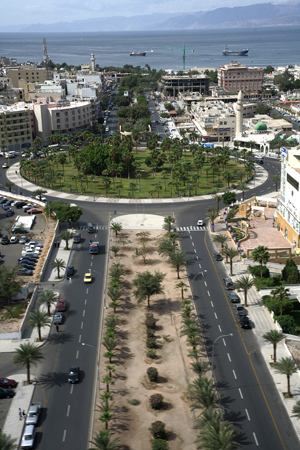Gulf of Aqaba
Gulf of Aqaba is a large gulf at the northern tip of the Red Sea, bordered by four countries: Egypt, Israel, Jordan, and Saudi Arabia. This body of water plays a significant role in the region's economy, particularly in terms of tourism, shipping, and as a strategic military passage. The gulf is known for its clear blue waters, vibrant coral reefs, and diverse marine life, making it a popular destination for diving and snorkeling enthusiasts.
Geography[edit | edit source]
The Gulf of Aqaba stretches over approximately 160 kilometers (99 miles) from the southern tip of the Sinai Peninsula to the Straits of Tiran, which connect it to the Red Sea. Its maximum width is about 24 kilometers (15 miles), and it is notably deep, reaching depths of over 1,800 meters (5,900 feet). The gulf's coastline features a mixture of sandy beaches, coral reefs, and rugged mountains, creating a picturesque landscape that attracts tourists from around the world.
Ecology[edit | edit source]
The marine ecosystem of the Gulf of Aqaba is known for its rich biodiversity. The coral reefs in the gulf are among the most northerly in the world and have shown a remarkable resilience to climate change and coral bleaching events that have affected other coral reefs globally. The gulf is home to over 1,000 species of fish, as well as a variety of corals, mollusks, crustaceans, and other marine life. Conservation efforts are in place to protect this unique ecosystem, including marine protected areas and regulations on fishing and tourism activities.
Economic Importance[edit | edit source]
The Gulf of Aqaba is a vital economic resource for the bordering countries. It serves as a critical shipping lane for Jordan and Israel, providing access to the Red Sea and beyond. The port cities of Aqaba (Jordan) and Eilat (Israel) are key hubs for maritime trade, tourism, and industry. The region's economy also benefits significantly from tourism, with visitors drawn to its natural beauty, historical sites, and recreational activities such as diving, snorkeling, and beach holidays.
Strategic Significance[edit | edit source]
Due to its geographical location, the Gulf of Aqaba has considerable strategic military importance. It offers the only sea access for Jordan and Israel, making it a critical point for the import and export of goods, including oil. The gulf's strategic significance has been highlighted during various conflicts in the Middle East, and it continues to be a focus of military and security considerations for the bordering countries.
Environmental Concerns[edit | edit source]
The Gulf of Aqaba faces several environmental challenges, including coral reef degradation, overfishing, and pollution from maritime traffic and coastal development. Efforts to address these issues involve local and international cooperation, research, and the implementation of sustainable practices to ensure the long-term health of the gulf's marine and coastal ecosystems.
Search WikiMD
Ad.Tired of being Overweight? Try W8MD's NYC physician weight loss.
Semaglutide (Ozempic / Wegovy and Tirzepatide (Mounjaro / Zepbound) available. Call 718 946 5500.
Advertise on WikiMD
|
WikiMD's Wellness Encyclopedia |
| Let Food Be Thy Medicine Medicine Thy Food - Hippocrates |
Translate this page: - East Asian
中文,
日本,
한국어,
South Asian
हिन्दी,
தமிழ்,
తెలుగు,
Urdu,
ಕನ್ನಡ,
Southeast Asian
Indonesian,
Vietnamese,
Thai,
မြန်မာဘာသာ,
বাংলা
European
español,
Deutsch,
français,
Greek,
português do Brasil,
polski,
română,
русский,
Nederlands,
norsk,
svenska,
suomi,
Italian
Middle Eastern & African
عربى,
Turkish,
Persian,
Hebrew,
Afrikaans,
isiZulu,
Kiswahili,
Other
Bulgarian,
Hungarian,
Czech,
Swedish,
മലയാളം,
मराठी,
ਪੰਜਾਬੀ,
ગુજરાતી,
Portuguese,
Ukrainian
Medical Disclaimer: WikiMD is not a substitute for professional medical advice. The information on WikiMD is provided as an information resource only, may be incorrect, outdated or misleading, and is not to be used or relied on for any diagnostic or treatment purposes. Please consult your health care provider before making any healthcare decisions or for guidance about a specific medical condition. WikiMD expressly disclaims responsibility, and shall have no liability, for any damages, loss, injury, or liability whatsoever suffered as a result of your reliance on the information contained in this site. By visiting this site you agree to the foregoing terms and conditions, which may from time to time be changed or supplemented by WikiMD. If you do not agree to the foregoing terms and conditions, you should not enter or use this site. See full disclaimer.
Credits:Most images are courtesy of Wikimedia commons, and templates, categories Wikipedia, licensed under CC BY SA or similar.
Contributors: Prab R. Tumpati, MD





